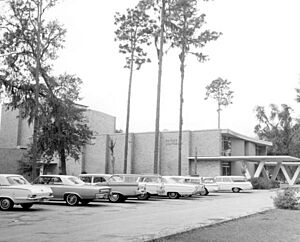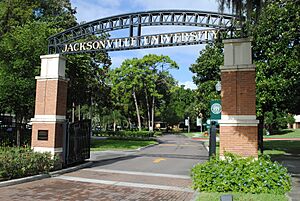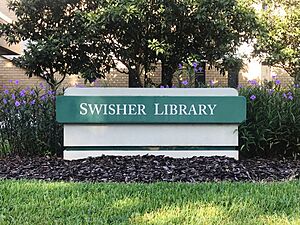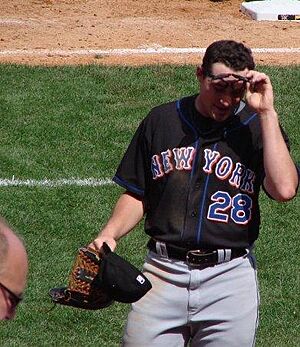Jacksonville University facts for kids
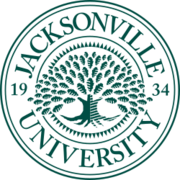 |
|
|
Former name
|
William J. Porter University (1934–1935) Jacksonville Junior College (1935–1958) |
|---|---|
| Motto |
Fiat Lux (Latin)
|
|
Motto in English
|
"Let There Be Light" |
| Type | Private University |
| Established | April 16, 1934 |
| Accreditation | SACS |
|
Academic affiliations
|
ICUF |
| Endowment | $59.2 million (2022) |
| President | Tim Cost |
| Provost | Sherri Jackson (interim) |
|
Academic staff
|
180+ |
| Undergraduates | 2,938 (fall 2019) |
| Postgraduates | 1,236 (fall 2019) |
| Location |
,
Florida
,
United States
30°21′12″N 81°36′16″W / 30.3532°N 81.6045°W |
| Campus | Large city, 260 acres (110 ha) |
| Newspaper | The Navigator |
| Colors | Green and white |
| Nickname | Dolphins |
|
Sporting affiliations
|
|
| Mascot | Nellie |
Jacksonville University (JU) is a private university in Jacksonville, Florida. This means it is not funded by the government. The school is located in the city's Arlington neighborhood. It was founded in 1934 as a two-year college. It was first called Jacksonville Junior College. In 1956, it began offering four-year degrees and changed its name to Jacksonville University.
The university is approved by the Southern Association of Colleges and Schools (SACS), which means it meets high educational standards. Students at JU come from over 40 states in the U.S. and about 45 other countries.
JU has 18 college sports teams that compete in NCAA Division I. The teams are called the JU Dolphins. Some of the most popular subjects for students to study at JU are aviation (flying planes), biology, nursing, business, and marine science (the study of the ocean).
Contents
History of the University
The school was started in 1934 by a man named William J. Porter. At first, it was called William J. Porter University. It was a small private college where students studied for two years. The first classes were held in a church building in downtown Jacksonville with only 60 students.
In 1935, the school's name was changed to Jacksonville Junior College. The school moved several times over the next 15 years. After World War II, many soldiers used money from the government (the GI bill) to go to college. This made the school grow quickly, and it needed a permanent home.
In 1947, the college bought land in the Arlington area of Jacksonville. This is where the campus is today. The first building was finished in 1950, and classes began there.
In 1958, the school joined with the Jacksonville College of Music and changed its name to Jacksonville University. A year later, in 1959, the first class of students to complete a four-year degree graduated. By the 1960s, the university was growing fast. More students enrolled, new dorms were built for students to live in, and the Swisher Gymnasium was built.
In 1970, the Jacksonville University Dolphins men's basketball team, led by star player Artis Gilmore, played in the national championship game. This was a very exciting time for the university.
In the 1990s, the university focused more on being a liberal arts college. This means it offered a wide range of subjects in arts and sciences. New buildings were also constructed, including a new cafeteria and student apartments.
In April 2025, the university announced plans to change its academic programs. These changes led to disagreements between the university's president, Tim Cost, and the faculty (the teachers). Some professors lost their jobs, and some students found out their majors would no longer be offered. Students and faculty held protests to show they were unhappy with the decisions.
Academics and Learning
Jacksonville University offers over 100 different subjects for students to study. These are called majors and minors. It also offers advanced degrees like master's and doctorate degrees for students who want to continue their education after college.
Getting into JU
In 2024, Jacksonville University accepted about 57% of the students who applied. This means it is a challenging school to get into. Students who were accepted had a high school GPA of around 3.61 on average. Students can submit their scores from tests like the SAT or ACT, but it is not required.
Colleges and Institutes
The university has five main colleges, which are like big departments for different subjects:
- College of Arts and Sciences: This college offers classes in subjects like science, math, history, and education. It is also home to the Naval Reserve Officer Training Corps (NROTC), which trains students to become officers in the U.S. Navy.
- Davis College of Business & Technology: This college teaches subjects like business, finance, marketing, and aviation management. It is a well-respected business school.
- College of Fine Arts & Humanities: Students here can study dance, theater, music, and art. The college has its own art gallery.
- College of Law: This is a new law school that opened in 2022. Students can study to become lawyers here.
- Brooks Rehabilitation College of Healthcare Sciences: This college focuses on health-related fields like nursing and physical therapy. It has a special STAR Center where students can practice medical situations, like childbirth, on realistic models.
The university also has special institutes for research in marine science, public policy (the study of government decisions), and STEAM (Science, Technology, Engineering, Arts, and Math).
University Sports
The JU sports teams, known as the Dolphins, compete in NCAA Division I. This is the highest level of college sports.
The baseball team has been very successful. The team has won six conference championships and has played in nine NCAA tournaments.
The men's basketball program is famous for its 1970 team. Led by future professional star Artis Gilmore, the team made it all the way to the NCAA national championship game before losing to UCLA. The next year, the team was the first in college history to average over 100 points per game.
The university had a football team from 1998 to 2019. The team won two conference championships before the program was ended.
JU also has a top-notch rowing team. The team has won state championships and has even competed in races around the world, including on the Nile River in Egypt.
Life as a Student
| Race and ethnicity | Total | ||
|---|---|---|---|
| White | 49% |
|
|
| Black | 20% |
|
|
| Hispanic | 14% |
|
|
| Foreign national | 7% |
|
|
| Other | 7% |
|
|
| Asian | 2% |
|
|
| Economic diversity | |||
| Low-income | 38% |
|
|
| Affluent | 62% |
|
|
JU has many student clubs and organizations. This includes fraternities and sororities, which are social groups for students.
There are also several student media groups on campus. Students can write for the newspaper, The Navigator, or work at the campus radio station, JU108. There is also a student-run TV station called the Dolphin Channel.
The University Library
The Carl S. Swisher Library is a large, three-story building on campus with beautiful views of the St. Johns River. It was named after Carl S. Swisher, who gave money to help build it.
The library has over 350,000 books, magazines, and music scores. It also has a large collection of digital resources that students can access online. The library offers help with research and provides a quiet place for students to study.
Famous Graduates
Many well-known people have graduated from Jacksonville University. This list includes former students who have become successful in different fields.
| Alumni | Notability |
|---|---|
| Aaron Bean | United States congressman |
| Bertice Berry | Sociologist and author |
| Alvin Brown | Former Mayor of Jacksonville |
| Dee Brown | NBA player and slam dunk contest winner |
| Jade Cargill | Professional wrestler for WWE |
| Artis Gilmore | Famous basketball player in the ABA and NBA, now in the Hall of Fame |
| Russell Knox | Professional golfer |
| Daniel Murphy | Major League Baseball player |
| Leonard Skinner | A gym teacher whose name inspired the band Lynyrd Skynyrd |
| Otis Smith | NBA player and former general manager |
| Will W. Weatherford | Former leader in the Florida government |
List of University Presidents
| No. | Term | Portrait | Name | Background | Education |
|---|---|---|---|---|---|
| 1 | 1934–1937 | William J. Porter | Former judge | ||
| 2 | 1939–1940 | Francis A. Waterhouse | Former professor | Harvard University (AB, MA, PhD) | |
| 3 | 1944–1951 | Garth H. Akridge | Director of Vocational Education | University of Central Arkansas (BA), Columbia University (MA, PhD) | |
| 4 | 1951–1956 | Paul L. Johnson | Professor | Central Missouri College (BA), Columbia University (MS, PhD) | |
| 5 | 1956–1963 | Franklyn A. Johnson | Former professor and World War II veteran | Harvard University | |
| 6 | 1964–1979 | Robert H. Spiro Jr. | Former dean at Mercer University | Wheaton College (BA) | |
| 7 | 1980–1989 | Frances B. Kinne | Founding dean of the JU College of Fine Arts | Drake University (BA, MA), University of Frankfurt (PhD) | |
| 8 | 1989–1996 | James J. Brady | Economist and former professional baseball pitcher | University of Notre Dame | |
| 9 | 1996–2000 | Paul S. Tipton | Former president of Spring Hill College | Spring Hill College (BA) | |
| 10 | 2000–2004 | David L. Harlow | Former chancellor of Rhodes College | George Washington University (MBA) | |
| 11 | 2004–2013 | Kerry D. Romesburg | Former president of two other colleges | Arizona State University (BS, MS, PhD) | |
| 12 | 2013–present | Tim P. Cost | Former executive at PepsiCo | Jacksonville University (BS), University of Rochester (MBA) |
See also
 In Spanish: Universidad de Jacksonville para niños
In Spanish: Universidad de Jacksonville para niños
 | Lonnie Johnson |
 | Granville Woods |
 | Lewis Howard Latimer |
 | James West |


